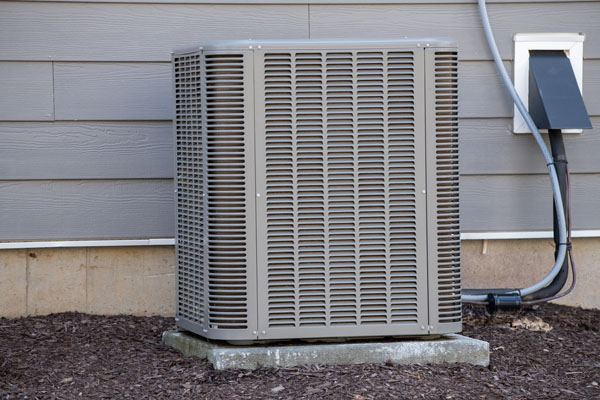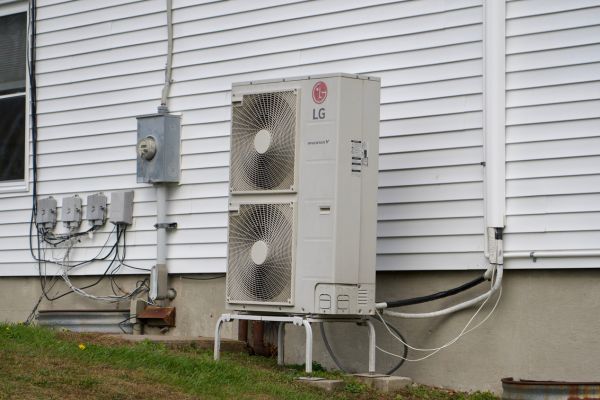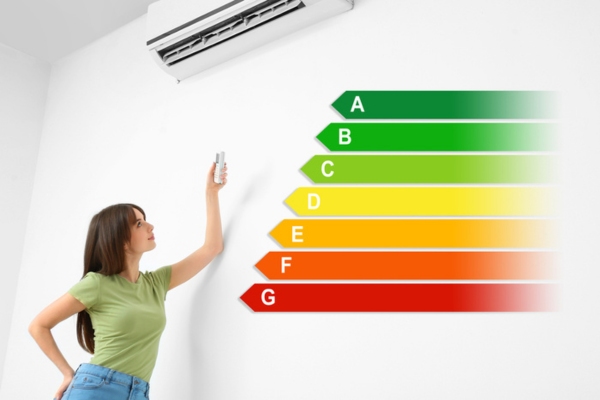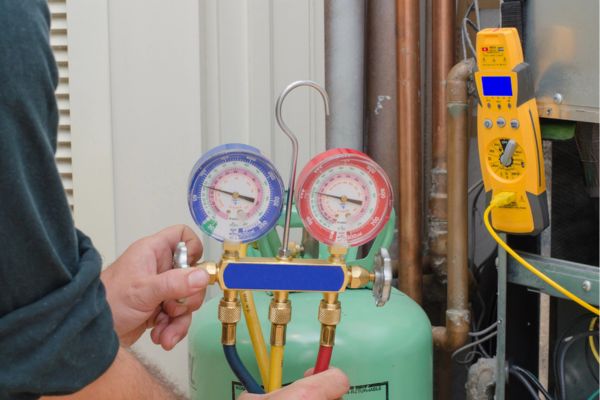Contents
Modern homes rely heavily on efficient cooling and heating systems in the pursuit of comfort. Maintaining a consistent indoor environment becomes paramount as temperatures fluctuate, highlighting the importance of selecting the right system. This article from Taylor Energy discusses the core functionalities and distinctions between two prevalent options: air conditioner vs. heat pump. Our objective is to delineate the differences and similarities between these systems. This can help empower homeowners to make informed decisions that best suit their climate control needs.
Understanding Air Conditioners

An air conditioner is an appliance designed to extract heat from an enclosed space and expel it outside, cooling indoor air. Its primary function is maintaining a comfortable room temperature and reducing humidity levels within residential and commercial environments. The process involves a refrigeration cycle where a chemical refrigerant captures heat and cycles it through a system of coils and a compressor to release it externally.
Don’t settle for less when it comes to your HVAC needs. Choose Taylor Energy for reliable service and exceptional results. Call now!
Components and Types of Air Conditioners
The main components of an air conditioning system include the compressor, which pressurizes the refrigerant to carry the heat; the evaporator coil, which absorbs indoor heat; and the condenser coil, which expels the heat outdoors. Depending on installation needs and space considerations, air conditioners come in several types:
- Central ACs: Ideal for cooling multiple rooms or an entire building, they use a system of ducts.
- Ductless Mini-Splits Air Conditioner: Provides targeted cooling without extensive ductwork, suitable for individual rooms/zones.
- Window Air Conditioning Units: Compact and designed to fit in standard window frames.
Exploring Heat Pumps
A heat pump is a versatile system that serves dual functions: heating and cooling an indoor space. Unlike traditional heating systems, a heat pump transfers heat rather than generating it through combustion, making it an efficient option for climate control. During warmer months, it operates like an air conditioner, extracting indoor heat and expelling it outside. In colder months, heat pumps reverse the process, drawing heat from the outside air to warm the indoors.
Components and Types of Heat Pumps

The essential parts of a heat pump include:
- The compressor circulates the refrigerant through the system.
- Evaporator and condenser coils that switch roles depending on the heating or cooling mode.
- The refrigerant itself carries heat across the system.
Heat pumps are primarily categorized into air-source and ground-source types. Air-source heat pumps are more common and transfer heat between the air inside and outside the home. In contrast, ground-source (geothermal) heat pumps utilize the stable underground temperature to offer heating and cooling. This offers homeowners remarkable efficiency over extended periods, albeit at a higher initial installation cost.
Key Differences: Air Conditioner Vs. Heat Pump
Understanding the primary differences between air conditioners and heat pumps can help homeowners choose the right system.
Cooling vs. Heating
Air conditioners are designed solely for cooling, making them ideal for hot, humid climates. In contrast, heat pumps provide heating and cooling by reversing their operational cycle, offering versatility for regions with moderate temperatures.
Reversible Operation & Energy Efficiency

Heat pumps are distinguished by their reversible operation, allowing them to heat or cool, a capability absent in conventional air conditioners. Due to their heat transfer process, they typically exhibit higher energy efficiency as well, measured by SEER for cooling and HSPF for heating.
For personalized HVAC guidance and professional installation, trust Taylor Energy to keep your home comfortable and efficient. Call now!
Suitable Climates & Cost Considerations
Air conditioners are best suited for areas with consistent, high heat, while heat pumps perform optimally in climates with mild winters. Heat pumps may cost more, particularly ground-source models, due to extensive installation requirements. However, operational costs are generally lower, potentially offering long-term savings in appropriate environments.
Similarities Between Air Conditioners & Heat Pumps

Despite their differences, air conditioners and heat pumps share several key features. Both systems utilize a refrigerant and rely on a similar cycle to transfer heat, effectively cooling a space by removing indoor warmth. This process is essential for their operation whether they are cooling or, in the case of heat pumps, also heating a space. Regular maintenance is another commonality; both systems require consistent check-ups to maintain optimal performance and extend their lifespan.
Additionally, programmable thermostats and other energy-saving accessories can enhance both air conditioners and heat pumps. These help improve efficiency and reduce energy consumption, aligning with modern energy standards and homeowner expectations.
Elevate your home comfort with Taylor Energy’s expert HVAC solutions tailored to your needs. Book a consultation with us today!
Choosing Between an Air Conditioning Unit & a Heat Pump

Multiple factors must be considered when selecting between an air conditioning system and a heat pump to ensure the choice meets individual needs and circumstances. The climate is one of the most critical factors; air conditioners are more suitable for regions with high temperatures and less seasonal variation, whereas heat pumps are perfect for areas with mild winters and moderate temperatures.
Budget also plays a significant role, as initial costs for heat pumps, especially geothermal ones, can be higher than for traditional air conditioners. However, they may offer lower long-term operating costs due to higher energy efficiency. Additionally, homeowners should consider their energy efficiency goals. Heat pumps generally provide greater efficiency because they transfer heat instead of creating it, which can be a decisive factor for those aiming to reduce their carbon footprint and utility bills.
Specific heating and cooling needs should also guide the decision; for example, a heat pump might be more beneficial if heating is as important as cooling. Finally, it is advisable to consult with HVAC professionals for personalized advice. These experts can provide insights based on the home’s structure, existing systems, and local climate conditions, and they can ensure proper installation and maximized performance of the chosen system.
Conclusion
In conclusion, while air conditioners and heat pumps both utilize a refrigerant-based cycle for heat transfer and require regular maintenance, they serve different needs: air conditioners exclusively cool, making them ideal for hot climates, whereas heat pumps provide both heating and cooling, suitable for milder climates with moderate temperatures. Choosing the right system is crucial for ensuring home comfort, maximizing energy efficiency, and reducing ongoing utility costs.
We encourage readers to consult with Taylor Energy for expert guidance tailored to your specific environmental and structural needs. Taylor Energy’s professional team can assist in navigating these choices and handling the installation process, ensuring optimal performance of your chosen system.
Call Taylor Energy for All Your HVAC Needs
For top-tier heating and cooling solutions across Northern Connecticut, look no further than Taylor Energy. Our team, composed of professionally certified technicians, excels in delivering various HVAC services, from routine maintenance and repairs to installations and system upgrades. We’re committed to ensuring your HVAC system receives the utmost care and service.
Taylor Energy prides itself on providing high-quality and affordable heating and cooling services. Our maintenance services are designed to boost your comfort and your system’s energy efficiency, helping lower your heating and cooling expenses. If repairs or replacements are what you need, we’re ready with cost-efficient options tailored to your specific needs, all guaranteed to meet your satisfaction. Contact Taylor Energy today for a free in-home estimate or to arrange for a service visit.
Click here to contact us now, or call us at (860) 623-3308 to find out more! Click the link to view our service area.

Related Articles:
